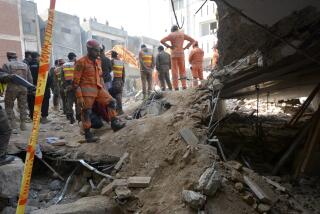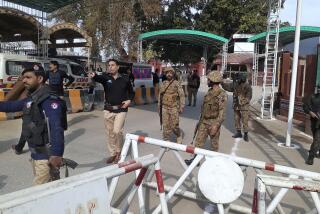Pakistan’s problem
- Share via
Decades ago, Daniel Patrick Moynihan, onetime U.S. ambassador to India, asked sarcastically if New Delhi exported anything but poverty. Today, Pakistan President Pervez Musharraf needs to ensure that Pakistan is known for exports other than terrorism.
Three of the four men involved in the London subway and bus bombings this month traveled to Pakistan last year; police are investigating if they received training or planned the attacks there. In Egypt, police are looking for five Pakistanis they say are connected to last week’s Sharm el Sheik bombings. In India, army officials said Monday that they had killed five armed infiltrators crossing from Pakistan into Indian-controlled Kashmir. Closer to home, the FBI last month arrested five men in Lodi, Calif., who have links to Pakistan; while all of them deny involvement in terrorism, two have agreed to be deported, and the others await a deportation hearing and a trial on charges of lying to federal agents.
Yes, there’s a pattern here. To be clear, it is not that Pakistanis are more inclined toward terrorism than are citizens of any other country. It is that Musharraf is unable, or unwilling, to confront the terrorists in his midst. Musharraf has even had the gall to say that while, yes, Pakistan has a problem with Islamic extremism, so does Britain and the government there needs to address it.
Pakistan is no stranger to radical Islam. The government used U.S. funds and support to train anti-Soviet warriors after Moscow’s 1979 invasion of neighboring Afghanistan. After the communists were defeated, the Pakistanis sponsored the Taliban fundamentalists who seized control and gave shelter to Osama bin Laden and Al Qaeda. But after 9/11, Musharraf threw in his lot with Washington and pledged to root out terrorism; President Bush praises Pakistan as a close ally in the battle.
Pakistan has arrested hundreds of suspected terrorists, including top Al Qaeda operatives. For his efforts, Musharraf has twice been the target of assassins. But terrorist training camps can still be found in Pakistan, and the army cracks down on infiltration into India only under foreign pressure.
Pakistani Cabinet minister Faisal Saleh Hayat told The Times editorial board Monday that most of the much-criticized Islamic schools known as madrasas -- where boys are educated, fed and clothed -- are moderate, like most Pakistanis. He contended that “no country in the world has done so much in combating terrorism” as Pakistan.
But Musharraf could direct his underlings to crack down harder. When outside pressure reaches a boil, he reacts. When the pressure eases, so does he. That’s not good enough.
The U.S. mistakenly turned away from Islamabad when the Cold War ended. But after 9/11, Washington’s interest rekindled, and the U.S. agreed to provide the impoverished nation with $3 billion, much of it to be spent on secular schools that teach reading and math, not just the Koran. Musharraf should use the money to educate a generation adhering to the moderate form of Islam that most of the country has long practiced.
More to Read
Sign up for Essential California
The most important California stories and recommendations in your inbox every morning.
You may occasionally receive promotional content from the Los Angeles Times.










